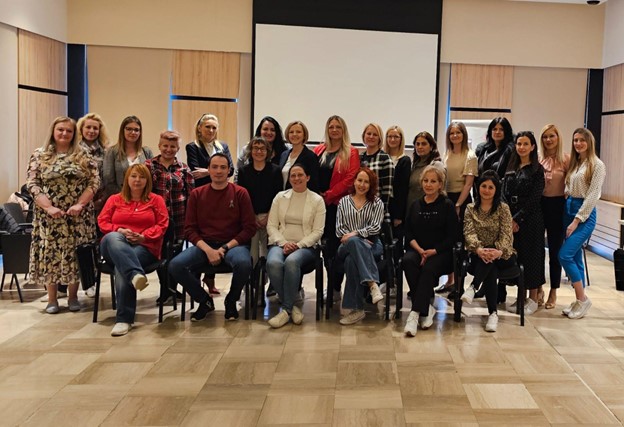Hotline: +381 61 63 84 071
Prevention of burnout syndrome in professionals working with victims of gender-based violence

Photo: NGO Atina
Prevention of burnout syndrome in professionals working with victims of gender-based violence
“Prevention of burnout syndrome in working with victims of gender-based violence” training was organized by NGO Atina on April 27 and 28, 2023, in Kragujevac. The training was attended by 22 professional workers who provide direct assistance and support to victims of gender-based violence, mainly those from the Safe houses for victims of violence in Vranje, Kragujevac, Niš, and Leskovac, as well as representatives of Centers for Social Work in Leskovac, Kragujevac, and Bojnik, but also representatives of the Basic Public Prosecutor's Office Kragujevac, and the Red Cross Kragujevac.
During the assessment of the current situation in Safe houses for victims of violence in Serbia, one of the identified needs of professional workers engaged in direct work with victims of violence was not only the prevention of professional burnout syndrome but also the ways to recognize and protect themselves against the negative consequences of intense feelings that providing support to victims and fighting violence can have. Psychologists with many years of professional and personal experience in working with women who survived violence, Dragana Ćuk Milankov and Jelena Milić Jerković, designed and implemented a training program focused on prevention, recognition, and guidelines on how to prevent and remedy the negative consequences of professional burnout, as well as recommendations which professional workers can apply in their daily work, to protect themselves against being overwhelmed by various intense feelings.
The training was conducted as workshops that included short presentations but were primarily based on activities encouraging experiential learning. The work process was carried out through various forms, such as work in small groups, pairs, and plenary discussions. Practical exercises followed the educational sessions so the participants could apply the skills they were presented with. Over the two days of the training, they covered topics that professional workers face in their daily work, primarily stress and various sources of stress, which, if there are no proper prevention and support techniques, can lead to burnout syndrome in certain situations. Defining professional roles and setting psychological boundaries were singled out as critical topics. Techniques for preventing and overcoming stress in working with victims of gender-based violence, which are equally connected to this challenge, were also improved through the work.
One of the most essential areas, crucial not only for the prevention of complicated feelings but also for the provision of adequate and comprehensive support to victims of gender-based violence, is communication skills. Communication skills, that is, a set of different forms and techniques of communication, in addition to practical guidelines, also included the exchange of experiences about how professional workers perceive the persons they work with, how victims who survived violence express their needs, and how professional workers understand and react to them. Communication skills are inseparable from active listening skills. Through various exercises, such as conducting interviews, the participants had the opportunity to apply communication and functional listening skills to understand the communication of persons who survived violence and their ways of expressing their needs, especially in challenging situations.
The final training session was organized by mapping and researching resources available to professional workers. Through joint activities in small groups and discussions in the plenum, participants were encouraged to find ways to connect with their external resources by mapping and exploring them. At the same time, they were empowered to seek help and involve other relevant actors in solving specific complex situations.
The weight of the helping professions, daily challenges, and finding solutions for them often prevent professional workers from leaving their “professional roles,” which leaves negative consequences for their daily functioning, professionally and privately. During the training, most participants pointed out that even their environment observes them through their profession and that it is tough to set boundaries and not be a helper outside the workplace.
Training participants pointed out through evaluations that they need to have trainings focused on this topic continuously and shared that practical examples, techniques, and guidelines they can apply in their work mean a lot to them.
The training was organized within the project “Enhancement of Safety of Women and Girls by Increasing Performance of Shelters for Victims of GBV and Domestic Violence,“ which NGO “Atina” is implementing in cooperation with the United Nations Agency for Gender Equality and the Empowerment of Women (UN Women), and with the support of the British Embassy in Belgrade.

This text was developed under the project “Safety of women and girls in Serbia,” implemented by UN Women Serbia in cooperation with the Coordination Body for Gender Equality and the Ministry of Labour, Employment, Veteran and Social Affairs, with the support of the British Embassy in Belgrade. The views in this text are those of the authors and do not necessarily represent the views of UN Women and the British Embassy in Belgrade












 FACEBOOK
FACEBOOK TWITTER
TWITTER YOUTUBE
YOUTUBE